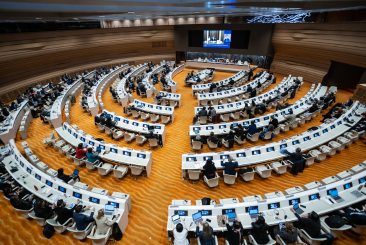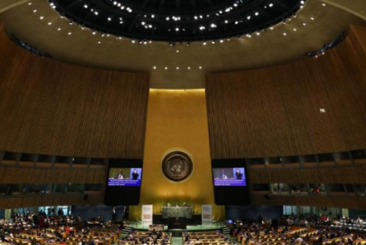Implementation of the 2030 Agenda and progress towards its 17 Sustainable Development Goals (SDGs) is monitored and reported on under a process that includes local, national, regional and global inputs.

Regional Fora
Regional Fora for Sustainable Development (RFSDs) are organized by the five UN Commissions of Africa, Western Asia, Asia and the Pacific, Europe and Latin America and the Caribbean, each year to support the follow-up and review of the 2030 Agenda implementation. These fora provide a platform for assessing progress and exchanging knowledge, best practices and policy solutions to support the implementation of the 2030 Agenda, in line with regional priorities and specificities.

High-level Political Forum on Sustainable Development
The global SDG review process culminates in the UN High-level Political Forum on Sustainable Development (HLPF). This annual meeting of ministers and Heads of State and Government, under the auspices of the UN Economic and Social Council (ECOSOC), conducts regular global reviews of the SDGs, with input from UN agencies, including FAO, and offers the opportunity for countries to present their national progress reviews.
SDG Summit
Every four years, an SDG Summit, is convened, under the auspices of the UN General Assembly. The summit brings together Heads of State and Government to assess progress towards achieving the 17 SDGs and provides renewed momentum and commitment to undertake actions for their implementation.
The first SDG Summit was held in 2019 and resulted in a call from world leaders for a dedicated Decade of Action, to deliver on the SDGs by 2030, as well as the announcement of acceleration actions to advance progress.
The second SDG Summit was held in September 2023, marking the mid-way point in the 2030 Agenda. Amid the multiple and interlocking crises globally, which have put the world off track for achieving the 2030 Agenda, the SDG Summit saw world leaders reaffirm their commitment to the SDGs and set new priorities on financing the transformation within the Political Declaration which was adopted by consensus. Additionally, the UN launched a number of new "High-Impact Initiatives" for bringing the SDG Solutions to scale.
Global Monitoring
The 17 Sustainable Development Goals (SDGs) and their 169 combined targets are tightly monitored using a set of 231 global indicators. These indicators were developed by the Inter-Agency and Expert Group on SDG Indicators and agreed upon at the 48th session of the United Nations Statistical Commission held in March 2017. Reflecting the 2030 Agenda's guiding principle of "leaving no one behind," these indicators are disaggregated by gender, age, income, geography, occupation, and other aspects of social identity.
FAO is the custodian UN agency for 21 indicators for SDGs 2, 5, 6, 12, 14 and 15, and a contributing agency for a further five.
As a custodian agency, FAO is responsible for the following:
- Collecting data from national sources, validating and harmonizing them, estimating regional and global aggregates and making them available for international reporting.
- Contributing to annual SDG progress reports, feeding into the High-Level Political Forum's follow-up and review processes. FAO's flagship publications include statistical analysis and commentary on relevant SDG indicators under FAO custodianship.
- Establishing partnerships with other international agencies to monitor the increased number of indicators crucial to achieving interrelated goals.
.png?sfvrsn=32282027_11)
Key Document
Tracking progress on food and agriculture SDG indicators 2023
The latest data indicate that most of the food- and agriculture-related SDG targets are still far from being achieved.
.png?sfvrsn=e51f85c8_7)
Data Portal
SDG Indicators Data Portal
FAO’s Sustainable Development Goals (SDG) Data Portal provides access to the 21 SDG indicators under FAO custodianship as well as key information to support countries in tracking progress towards SDGs.
.png?sfvrsn=78fab8b7_11)
Tool
FAO SDG Progress Assessment
The FAO SDG Progress Assessment App is a web-based tool designed to automatize the assessment of progress made at national, regional, global levels towards the achievement of the SDGs. The tool allows performing current status and trend assessment adopting the methodology developed by FAO, providing downloadable tabular and graphical representations of the results.
Country Monitoring
In addition to the global indicators, national governments have developed their own national indicators to track the progress made on nationally tailored targets. FAO supports countries strengthen their capacities to:
- Collect and monitor data on the SDGs. For example, FAO provided training to institutions on the use of tools and technologies for efficient data collection, analysis and reporting on land assessments and socio-economic indicators.
- Ensure that national data is comparable and aggregated at sub-regional, regional and global levels through developing and communicating best practice guidelines and technical supports.
FAO also supports countries preparing Voluntary National Reviews, a key feature of the follow-up and review process within the 2030 Agenda. These state-led reviews facilitate sharing experiences, including successes, challenges and lessons learned at the High-level Political Forum (HLPF) each year. They also help strengthen policies and institutions and mobilize multi-stakeholder support and partnerships to implement the Sustainable Development Goals.
Private Sector Monitoring
The private sector too has a critical role to play in advancing the 2030 Agenda. It is important that this contribution also be monitored and reported on, not only to hold the private sector accountable to this global effort, but also to enhance the data contributed to national reporting on SDGs progress.
FAO has developed a set of core indicators for the private sector to align their reporting on sustainability efforts with the SDGs and specific targets. It provides practical information on how food and agriculture companies' contribution to the SDGs can be measured consistently and in alignment with countries' needs.
FAO is committed to working hand in hand with the private sector and national governments to accelerate actions and improve accountability to achieve agrifood systems transformation and the SDGs. The Organization will continue to work with partner organizations to ensure that the indicators contribute to strengthening existing reporting and accounting standards, agrifood benchmarks, and accountability frameworks. FAO also supports member countries using the indicators to develop or improve national corporate reporting and accountability mechanisms to better capture and encourage private sector entities to increase their impact on the SDGs.
.png?sfvrsn=6922a109_11)
Tool
Guidance on core indicators for agrifood systems
Measuring the private sector’s contribution to the Sustainable Development Goals
.png?sfvrsn=d644371b_6)
Tool
The OECD-FAO Guidance for Responsible Agricultural Supply Chains
Helping achieve the Sustainable Development Goals

c0ff5f81-be23-4cbb-96be-2772b43493fc.png?sfvrsn=4ee32555_16)
.png?sfvrsn=c1fdd887_11)
.png?sfvrsn=2e45aff8_11)

.png?sfvrsn=a0d66bf0_11)
.png?sfvrsn=7a646b55_11)

